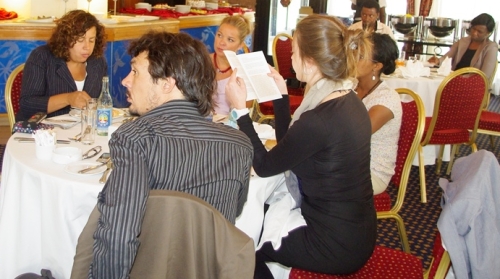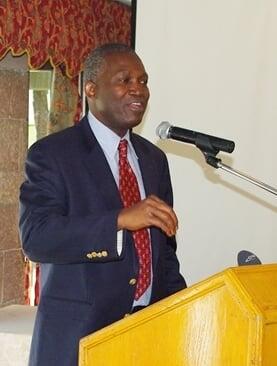“All Africans should be able to exercise their right to plan their families with appropriate family planning methods of their choice. But women in most parts of the continent still have far fewer options,” said UNFPA Africa Regional Director, Mr. Bunmi Makinwa, at a media presentation in Addis Ababa, Ethiopia, on UNFPA’s flagship publication, State of World Population 2012.
The presentation was attended by delegates from UNECA , the African Union Commission (AUC), national and international media, and young people.
Emphasizing the title of the report, ‘By Choice, Not by Chance’, Mr. Makinwa observed that while the use of modern methods of family planning has increased in recent years in East Africa, particularly Ethiopia, Malawi and Rwanda, there has been no increase in the use of modern methods in Central and West Africa. This implies that women and young people in this part of Africa have not been able to fully realise their rights to sexual and reproductive health, he said.
Family planning represents an important investment against poverty and against maternal deaths. Most unintended pregnancies ending in abortion result from non-use of a contraceptive method or from method failure, particularly of a traditional method such as withdrawal. Addressing women’s concerns about modern methods and helping women who stop using one method to find a new and effective one could reduce unintended pregnancies in sub-Saharan Africa, he said.
The continent is challenged by the high number of maternal deaths experienced in most countries, and in recognition of the need to reduce maternal mortality, UNFPA in conjunction with the AU initiated the Campaign for Accelerated Reduction of Maternal Mortality in Africa (CARMMA) in 2009. This has contributed to the remarkable drop of 41 per cent in maternal deaths in Africa between 1990 and 2010. By early 2012, 37 countries in the region had launched CARMMA and in many of these countries, the national champions of CARMMA or the national authorities have committed to follow-up activities to intensify the reduction of maternal mortality in their countries.
A major contributing factor to these deaths is that many women have an unmet need for family planning – 18 per cent in the developing world generally, but the figure is far higher for West, Central and East Africa, where it ranges between 30 and 37 per cent. Weak health systems and poor services contribute to the high unmet need, particularly in West and Central Africa, he said.

Mr. Makinwa added that it is also the right of young people to have the necessary comprehensive sexuality education, including the provision of information, skills and service, and an enabling environment for them to fulfil their sexual rights. An analysis of 24 sub-Saharan African countries showed that the adolescents most likely to become mothers are poor, uneducated and live in rural areas. In the sub-region, girls with secondary schooling are more than four times more likely to use contraception than girls with no education. Not surprisingly, birth rates among uneducated adolescent girls are four times higher than among girls who have secondary schooling, he said.
Mr. Yinka Adeyemi of UNECA advised the media professionals to challenge conventional wisdom and assumptions in their coverage of social issues. “It is important to report family planning and HIV issues from a different perspective because many of our traditional assumptions are not supported by evidence and reality,” he said.
In a highly interactive session, the media and youth participants engaged in an exchange of ideas during the presentation. Young people offered solutions on how to increase the access of young people to family planning commodities through a combination of facility-based and youth-friendly centres. They also emphasized the important role of youths as advocates of their sexual and reproductive health rights.
~ Adebayo Fayoyin, with additional reporting by Lindsay Barnes


